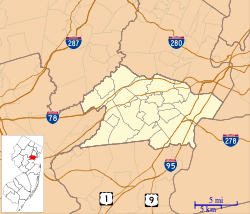Elizabeth Public Library

The Elizabeth Public Library is the free public library of Elizabeth, New Jersey. Serving a population of approximately 127,558, its collection contains 342,305 volumes, circulating 190,581 items annually [1] from its four locations.[2]
Locations
- Main Library - 11 South Broad Street
- LaCorte Branch Library - 408 Palmer Street
- Elmora Branch Library - 730 W. Grand Street
- Elizabethport Branch Library - 102-110 Third Street
Carnegie library building
|
Mid-Town Historic District | |
 | |
| NRHP Reference # | 95001143 |
|---|---|
| NJRHP # | 2665[3] |
| Significant dates | |
| Added to NRHP | October 5, 1995 |
| Designated NJRHP | September 29, 1994 |
Elizabeth's Main Library was built during the "free library movement" at the turn of the 20th century in part with the impetus of Charles N. Fowler,[4] US Congressman from Union County. It is one of New Jersey's original thirty-six Carnegie libraries, which by the 1940s had become one of the busiest libraries of its size in the USA.[5] Records show that millionaire Andrew Carnegie granted $130,810 made February 3, 1910, for the main and no longer existing Liberty Plaza branch libraries.[6][7] Opened in 1912, the building, reminiscent of an Italian palazzo and the Boston Public Library was designed by Edward Lippincott Tilton,[8] who had designed many other Carnegie libraries as well as the immigration station at Ellis Island. It is a contributing property to the Midtown Historic District, a state and federal historic district established in 1994-1995.[3] The Main Library is the Federal Depository Library for Union County.
See also
- List of Carnegie libraries in New Jersey
- National Register of Historic Places listings in Union County, New Jersey
References
- ↑ "Elizabeth Public Library". librarytechnology.org. September 21, 2011. Retrieved 2011-10-06.
- ↑ "Libraries". Visiting Elizabeth Attractions. City of Elizabeth. Retrieved 2011-10-07.
- 1 2 "New Jersey and National Registers of Historic Places - Union County". New Jersey Department of Environmental Protection - Historic Preservation Office. Retrieved 2014-10-06.
- ↑ "Libraries in New Jersey Growth of the Movement for the Free Circulation of Books", The New York Times, December 16, 1900
- ↑ Rizzo, Joe (with Ellen (January 12, 2003), "My Job; Coming to the Rescue of Run-Down Libraries", The New York Times, retrieved 2011-10-03,
One project I'm especially proud of is the Elizabeth Public Library, also in New Jersey. At the turn of the last century, Andrew Carnegie was benefactor to hundreds of libraries in the United States, and this is a Carnegie library. In the 1940s, it was one of the busiest libraries in the country for its size. But by the 1960s, with the shift to suburban development, circulation had seriously declined. In the 1990s, the city brought in a new librarian. He hired me to bring the building up to date. It hadn't been significantly renovated since the early 1960s. The carpets were ripped, the furniture was ancient and the roof was leaking. Some of the book collections hadn't been updated in more than 50 years. My team and I built a 2,000-square-foot room at the front of the building. There, we assembled the library's media collections, which had previously been kept out of sight: videotapes, audiotapes and CD's. We put these on prominent display in the new room. People loved it; circulation went way up. We also moved the children's area to the ground floor of the library. It had been next to the reference room, up a gigantic flight of stairs. Imagine all those noisy children next to people studying, or a mother having to push a stroller up all those stairs. The changes were a huge success. On the day of the dedication, one of the patrons came over to me and said, You gave us back our old library -- and gave us a new one.
- ↑ Bobinski, George S. (1969). Carnegie Libraries: Their History and Impact on American Public Library Development. Chicago: American Library Association. ISBN 0-8389-0022-4.
- ↑ Jones, Theodore (1997). Carnegie Libraries Across America. New York: John Wiley & Sons. ISBN 0-471-14422-3.
- ↑ Slyck, Abigail A., Free to All Carnegie Libraries & American Culture, 1890-1920, University of Chicago Press, ISBN 978-0-226-85032-0
External links
Coordinates: 40°39′42″N 74°12′55″W / 40.661539°N 74.215199°W